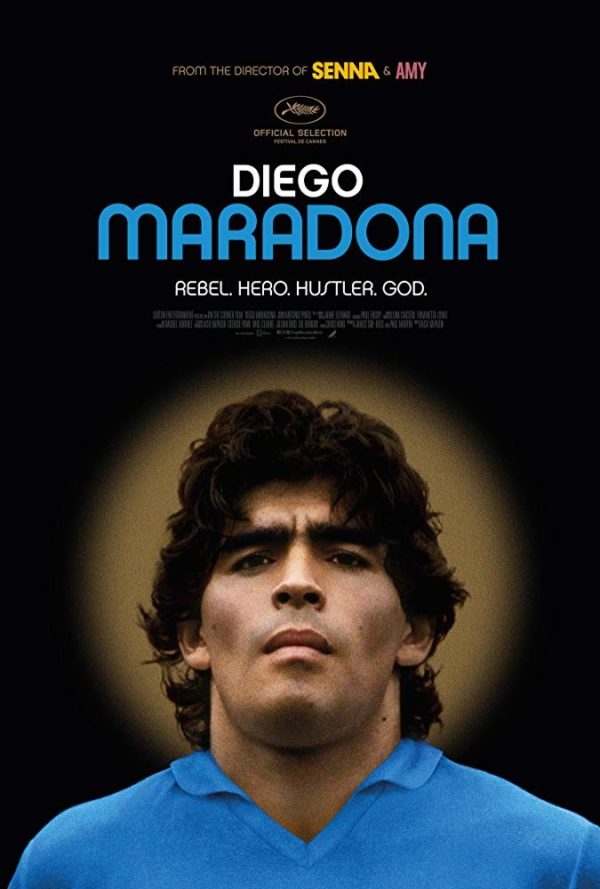Diego Maradona, 2019.
Directed by Asif Kapadia.
SYNOPSIS:
The story of the legendary Argentinian footballer’s turbulent years playing for Napoli in Italy, which saw his greatest successes and lowest points.
Asif Kapadia has made his name in the last few years through exhaustive, compelling documentary portraits of tragic geniuses. In Formula One tale Senna, he examined the friction between the pursuit of sporting excellence and the risk of that ambition, while Amy showed the toxic impact of fame on a young woman ill-prepared to become one of the biggest pop stars in the world. Both of those themes would seem to collide in Diego Maradona – the story of an elite sportsman who was also one of the most famous men on the planet.
As usual, Kapadia eschews talking heads and allows his tale to unfold through archive footage, accompanied by audio interviews. Maradona himself sat down for hours with Kapadia, but the film, quite fairly, seems distrustful of his account and spends more time with his personal trainer Fernando Signorini and his now ex-wife Claudia Villafañe. Much of the film takes place between 1984 and 1992, during Maradona’s tenure at the Italian club Napoli. He joined the club as a megastar, but left in disgrace over cocaine use and in the wake of a World Cup that saw him become a villain in the country he had made his home.
In order to join the dots between those events, Kapadia teases out his protagonist as a figure of duality. On the one hand, there’s the shy Diego, who is simply a talented footballer determined to escape his impoverished upbringing in Argentina. The other half of him, though, is Maradona – a larger than life figure invented to shoulder the pressures of fame. One of these people is easy to love, while the other is willing to buddy up with Neapolitan crime families and declare that football is “the game of deceit”.
There’s no denying that Maradona is a compelling figure, but he’s perhaps most impressive here as a sporting genius, nonchalantly performing keep-ups with just his heel in one early scene. Kapadia achieves the genuinely admirable feat of making football truly cinematic, with the help of unique camera angles captured by Maradona’s personal cameramen during his playing days – showcasing The Beautiful Game beyond the comfortable familiarity of how it’s shown on television every weekend.
The football stuff here is more interesting than everything else, with a second half move into a Goodfellas-esque world of gangsters proving to be a side of the story that never lands the punch it almost certainly should. Diego Maradona works best when it examines the intersection between Maradona’s actions on the pitch and his status off it. There’s the infamy of his post-Falklands War ‘Hand of God’ goal against England and, most shockingly, the Italia ’90 match that transformed him from an adopted Neapolitan hero to the person voted “most hated person in Italy”. These events are well known to football fans, but they’re great stories for a reason.
Diego Maradona has Kapadia making a documentary about a living person, rather than a star who was taken from us in tragic fashion. As a result, the movie lacks a neat narrative structure and feels like it stops arbitrarily, rather than achieving a natural conclusion. Kapadia focuses on the Napoli years, but never provides much of an idea of where the land lies now in order to tie everything together. This lacks the thematic depth of Kapadia’s two previous films, but especially Amy and its pointed questioning of the audience’s complicity in Amy Winehouse’s decline.
It might not boast the immediate power of his previous films, but Kapadia remains on exciting form with Diego Maradona. This is an effective and consistently entertaining portrait of a legendary figure that admirably attempts to scratch beneath the surface of the character, even if he never quite seems able to chisel through the layers of artifice and pageantry surrounding his dynamic protagonist. It’s a character study surrounded by Antônio Pinto’s score and pieced together with real flair, like an elegant jigsaw, by Kapadia and editor Chris King.
No one makes documentaries like this guy, and we’re lucky to have him behind the camera.
Flickering Myth Rating – Film: ★ ★ ★ ★ / Movie: ★ ★ ★ ★
Tom Beasley is a freelance film journalist and wrestling fan. Follow him on Twitter via @TomJBeasley for movie opinions, wrestling stuff and puns.















